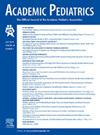The Association Between Child Food Allergy and Family Food Insecurity in a Nationally Representative US Sample
IF 3
3区 医学
Q1 PEDIATRICS
引用次数: 0
Abstract
Objective
To assess whether child food allergy is associated with family food insecurity, overall, and across different income levels.
Methods
We used the 2011–2018 National Health Interview Survey, a nationally representative cross-sectional survey. The exposure was child food allergy, and our main outcome was odds of family food insecurity, which was calculated using multivariable logistic regression models adjusted for child demographics, family characteristics and survey year. We examined for effect modification by the ratio of family income to the poverty threshold using stratification and tests for statistical interaction.
Results
Among 83,287 children, 6% had food allergy and 22% experienced family food insecurity. Child food allergy was associated with a 1.39-fold (95% confidence interval [CI]: 1.26, 1.53) increased odds of family food insecurity overall. Child food allergy was associated with a 1.46-fold (95% CI: 1.29, 1.66) increased odds of family food insecurity among children whose families lived below 200% of the federal poverty level, and a 1.26-fold (95% CI: 1.05, 1.51) increased odds of family food insecurity among children whose families lived at 200 to 399% of the federal poverty level, with no association among children whose families lived at or above 400% of the federal poverty level (P = .04 for interaction).
Conclusion
There is an association between child food allergy and family food insecurity, and this association is modified by the ratio of family income to the poverty threshold. Improved availability and subsidy of allergen-free foods in nutrition assistance programs and food pantries are urgently needed.
在具有全国代表性的美国样本中,儿童食物过敏与家庭食物不安全之间的关系。
目的评估儿童食物过敏是否与整体家庭食物不安全以及不同收入水平的家庭食物不安全有关:我们采用了 2011-2018 年全国健康访谈调查,这是一项具有全国代表性的横断面调查。调查对象是儿童食物过敏,主要结果是家庭食物不安全的几率,该几率通过多变量逻辑回归模型计算,并对儿童人口统计学特征、家庭特征和调查年份进行了调整。我们通过分层和统计交互检验,检查了家庭收入与贫困线的比率对效果的影响:在 83,287 名儿童中,6% 的儿童患有食物过敏症,22% 的儿童面临家庭食物不安全问题。儿童食物过敏导致家庭食物无保障的几率增加了 1.39 倍(95% 置信区间 [CI]:1.26, 1.53)。在家庭生活水平低于联邦贫困线 200% 的儿童中,儿童食物过敏导致家庭食物不安全的几率增加 1.46 倍(95% 置信区间:1.29, 1.66);在家庭生活水平处于联邦贫困线 200% 至 399% 的儿童中,儿童食物过敏导致家庭食物不安全的几率增加 1.26 倍(95% 置信区间:1.05, 1.51);在家庭生活水平处于联邦贫困线 400% 或以上的儿童中,儿童食物过敏与家庭食物不安全的几率没有关系(交互作用 P =.04):儿童食物过敏与家庭食物不安全之间存在关联,这种关联会因家庭收入与贫困线的比率而改变。营养援助计划和食品储藏室急需改善无过敏原食品的供应和补贴。
本文章由计算机程序翻译,如有差异,请以英文原文为准。
求助全文
约1分钟内获得全文
求助全文
来源期刊

Academic Pediatrics
PEDIATRICS-
CiteScore
4.60
自引率
12.90%
发文量
300
审稿时长
60 days
期刊介绍:
Academic Pediatrics, the official journal of the Academic Pediatric Association, is a peer-reviewed publication whose purpose is to strengthen the research and educational base of academic general pediatrics. The journal provides leadership in pediatric education, research, patient care and advocacy. Content areas include pediatric education, emergency medicine, injury, abuse, behavioral pediatrics, holistic medicine, child health services and health policy,and the environment. The journal provides an active forum for the presentation of pediatric educational research in diverse settings, involving medical students, residents, fellows, and practicing professionals. The journal also emphasizes important research relating to the quality of child health care, health care policy, and the organization of child health services. It also includes systematic reviews of primary care interventions and important methodologic papers to aid research in child health and education.
 求助内容:
求助内容: 应助结果提醒方式:
应助结果提醒方式:


